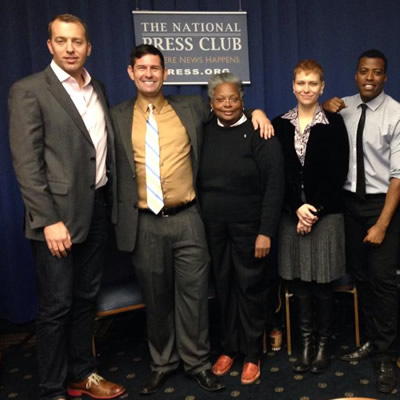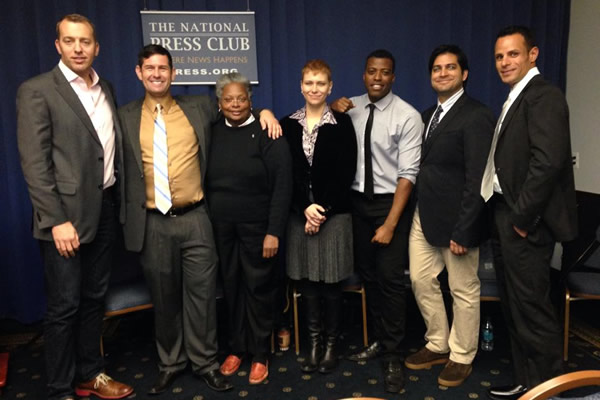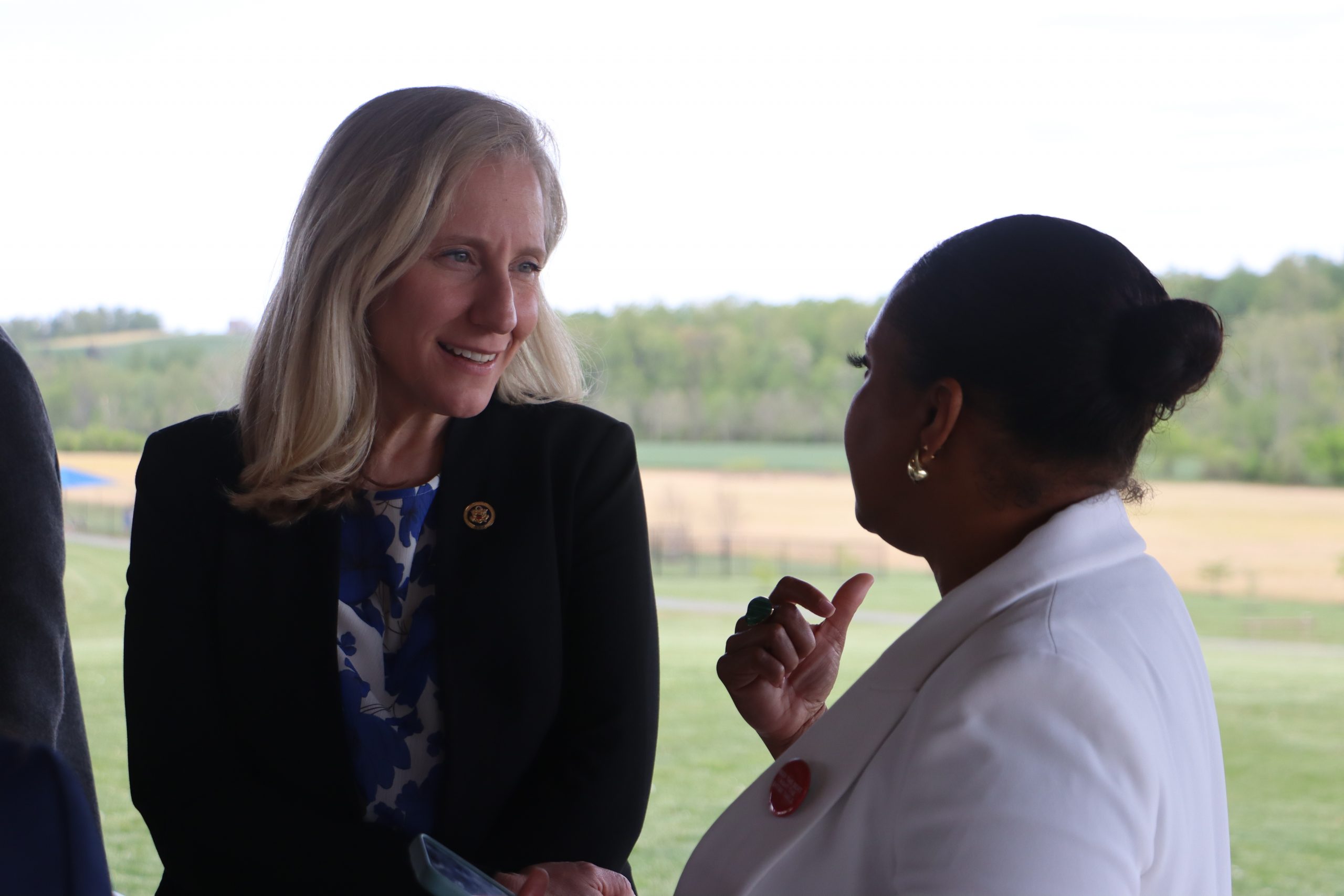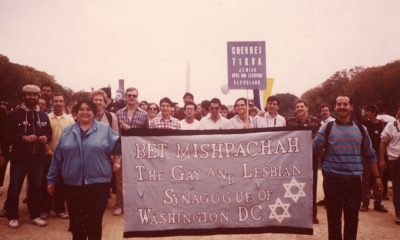News
Panel of journalists, activists tackles outing, Russia, ENDA
‘LGBTs In The News’ series next heads for NYC


Panelists included (left to right) Kevin Naff, Thom Senzee, Mandy Carter, Sarah Blazucki, Rob Smith, Adam Moore and Will Walters. (Photo courtesy of Thom Senzee)
Last week’s engagement at the National Press Club of the “LGBTs In The News” panel series, currently on a nationwide tour, revealed differences in opinion about the ethics of outing.
Comprised of leaders from the fields of journalism, entertainment and activism, the panel also shed light on the need for greater opportunities for LGBT actors and broadcast personalities and for better coverage of people of color at the front lines of the LGBT-equality movement.
Citing a landmark report his organization released last year, which was researched and compiled by the Williams Institute at UCLA, SAG-AFTRA’s national director of EEO and diversity, Adam Moore noted that the entertainment industry in the U.S. is the “most visible workplace on Earth,” and that as LGBT actors and media professionals gain parity in job opportunities, the entertainment industry and news business can lead by example as models of equal opportunity.
“We’ve already come a long way in our industries,” said Moore. “But you might be surprised how far we still have to go. This is an industry that is still run by a lot of very traditional, very conservative and highly risk-averse people at the top.”
Perhaps surprisingly, the controversy surrounding the 2014 Winter Olympics at Sochi vis-à-vis Russia’s anti-gay-propaganda law was, for all intents and purposes, only modestly grazed as a point of discussion during the panel.
However, passage of the Employment Non-Discrimination Act was a hot topic among the panelists.
“What I believe, and as Arizona Governor Jan Brewer learned recently, corporations that have already instituted non-discrimination policies for LGBT workers are inclined to put pressure on congress to pass ENDA,” said panelist Will Walters, whose civil rights education organization, FreeWillUSA is a major sponsor of the panel series. “Ironically, big business may force ENDA to a ‘yes’ vote in the long run.”
The discussion, which was also sponsored by the Washington Blade and SAG-AFTRA (formerly the Screen Actors Guild) and held in the National Press Club’s Edward R. Murrow Room, soon turned to the enduring question of whether it is ethical for, or even incumbent upon, reporters to disclose secretly gay public figures’ sexual orientation.
“If you’re a private citizen with no public persona, that’s one thing,” Blade editor, Kevin Naff said. “However, there’s an entirely different set of rules that are specific to people in the public eye. They’ve chosen a path in the limelight and they are fair game—especially when they’re hurting other gay people and being hypocritical at the same time.”
According to Naff, ultimately it matters not whether a closeted public figure is hostile to the cause of LGBT equality.
“If they’re a public figure, reporting their sexual orientation is fair game,” he said. “If you’re in the public eye, this is part of what you signed up for.”
But author-activist and Iraq war veteran, Rob Smith disagreed.
“It’s not up to me to tell someone, even if they are against us publicly, ‘you’re going to be outed whether you like it or not,’” he said. “I’m sorry, but that’s not right; and it hurts us all in the long run.”
At least one other panelist, civil rights leader Mandy Carter, agreed with Smith.
“It can cause all kinds of damage in a person’s life to be outed, including loss of career and even suicide,” said Carter, who is co-founder of the National Black Justice Coalition. “I’m not going to be the one to decide for you whether or not you should come out of the closet.”
Working with other individuals and organizations, not least among them, Walter Naegle, surviving partner of the late Bayard Rustin, Carter has been a key figure in helping increase awareness about Rustin’s role alongside civil rights activist, A. Philip Randolph as chief organizer of the 1963 March on Washington for Jobs and Freedom, where Dr. Martin Luther King delivered his famous “I Have a Dream” speech.
There was consensus among all of the panelists about the importance of educating the world about Bayard Rustin, who was openly gay in the 1940s, ‘50s, ‘60s and beyond, but who—despite being among Dr. King’s closest advisers—was kept out of the public eye as much as possible for fear that the Civil Rights movement might be “tarnished” by Rustin’s homosexuality.
All of the panelists agreed that passing ENDA was probably the most important goal the LGBT community has on its plate at the moment. Yet, each agreed that passage of ENDA in 2014 is all but impossible.
“I think 2015 looks a little more plausible,” said National Lesbian and Gay Journalists Association vice president of print and online media, Sarah Blazucki.
The next “LGBTs In The News” panel will be in late spring in New York City and will feature the theme: “LGBTs and Our Allies: We couldn’t do it without you.”
“New York promises to be a decidedly star-studded panel, as we expect to have some of the music industry’s most illustrious LGBT allies and community members on the panel,” said series founder and panel moderator, Thom Senzee, a freelance journalist.
“Stay tuned for a major announcement about our confirmed panelists for the New York engagement of LGBTs In The News.”
Visit lgbtsinthenews.com for more information.
U.S. Supreme Court
Supreme Court hears oral arguments in LGBTQ education case
Mahmoud v. Taylor plaintiffs argue for right to opt-out of LGBTQ inclusive lessons

The U.S. Supreme Court on Tuesday heard oral arguments in Mahmoud v. Taylor, a case about whether Montgomery County, Md., public schools violated the First Amendment rights of parents by not providing them an opportunity to opt their children out of reading storybooks that were part of an LGBTQ-inclusive literacy curriculum.
The school district voted in early 2022 to allow books featuring LGBTQ characters in elementary school language arts classes. When the county announced that parents would not be able to excuse their kids from these lessons, they sued on the grounds that their freedom to exercise the teachings of their Muslim, Jewish, and Christian faiths had been infringed.
The lower federal courts declined to compel the district to temporarily provide advance notice and an opportunity to opt-out of the LGBTQ inclusive curricula, and the 4th U.S. Circuit Court of Appeals determined that the parents had not shown that exposure to the storybooks compelled them to violate their religion.
“LGBTQ+ stories matter,” Human Rights Campaign President Kelley Robinson said in a statement Tuesday. “They matter so students can see themselves and their families in the books they read — so they can know they’re not alone. And they matter for all students who need to learn about the world around them and understand that while we may all be different, we all deserve to be valued and loved.”
She added, “All students lose when we limit what they can learn, what they can read, and what their teachers can say. The Supreme Court should reject this attempt to silence our educators and ban our stories.”
GLAD Law, NCLR, Family Equality, and COLAGE submitted a 40-page amicus brief on April 9, which argued the storybooks “fit squarely” within the district’s language arts curriculum, the petitioners challenging the materials incorrectly characterized them as “specialized curriculum,” and that their request for a “mandated notice-and-opt-out requirement” threatens “to sweep far more broadly.”
Lambda Legal, the Leadership Conference on Civil and Human Rights, PFLAG, and the National Women’s Law Center announced their submission of a 31-page amicus brief in a press release on April 11.
“All students benefit from a school climate that promotes acceptance and respect,” said Karen Loewy, senior counsel and director of constitutional law practice at Lambda Legal. “Ensuring that students can see themselves in the curriculum and learn about students who are different is critical for creating a positive school environment. This is particularly crucial for LGBTQ+ students and students with LGBTQ+ family members who already face unique challenges.”
The organizations’ brief cited extensive social science research pointing to the benefits of LGBTQ-inclusive instruction like “age-appropriate storybooks featuring diverse families and identities” benefits all students regardless of their identities.
Also weighing in with amici briefs on behalf of Montgomery County Public Schools were the National Education Association, the ACLU, and the American Psychological Association.
Those writing in support of the parents challenging the district’s policy included the Center for American Liberty, the Manhattan Institute, Parents Defending Education, the Alliance Defending Freedom, the Trump-Vance administration’s U.S. Department of Justice, and a coalition of Republican members of Congress.
U.S. Supreme Court
LGBTQ groups: SCOTUS case threatens coverage of preventative services beyond PrEP
Kennedy v. Braidwood oral arguments heard Monday

Following Monday’s oral arguments before the U.S. Supreme Court in Kennedy v. Braidwood Management, Inc., LGBTQ groups issued statements warning the case could imperil coverage for a broad swath of preventative services and medications beyond PrEP, which is used to reduce the risk of transmitting HIV through sex.
Plaintiffs brought the case to challenge a requirement that insurers and group health plans cover the drug regimen, arguing that the mandate “encourage[s] homosexual behavior, intravenous drug use, and sexual activity outside of marriage between one man and one woman.”
The case has been broadened, however, such that cancer screenings, heart disease medications, medications for infants, and several other preventive care services are in jeopardy, according to a press release that GLAAD, Lambda Legal, PrEP4All, Harvard Law’s Center for Health Law and Policy Innovation (CHLPI), and the Center for HIV Law and Policy (CHLP) released on Monday.
The Trump-Vance administration has argued the independent task force responsible for recommending which preventative services must be covered with no cost-sharing for patients is constitutional because the secretary of the U.S. Department of Health and Human Services can exercise veto power and fire members of the volunteer panel of national experts in disease prevention and evidence-based medicine.
While HHS secretaries have not exercised these powers since the Affordable Care Act was passed in 2010, Braidwood could mean Trump’s health secretary, Robert F. Kennedy Jr., takes a leading role in determining which services are included in the coverage mandate.
Roll Call notes the Supreme Court case comes as the administration has suspended grants to organizations that provide care for and research HIV while the ongoing restructuring of HHS has raised questions about whether the “Ending the HIV Epidemic” begun under Trump’s first term will be continued.
“Today’s Supreme Court hearing in the Braidwood case is a pivotal moment for the health and rights of all Americans,” said GLAAD President Sarah Kate Ellis. “This case, rooted in discriminatory objections to medical necessities like PrEP, can undermine efforts to end the HIV epidemic and also jeopardize access to essential services like cancer screenings and heart disease medications, disproportionately affecting LGBTQ people and communities of color.”
She added, “Religious exemptions should not be weaponized to erode healthcare protections and restrict medically necessary, life-saving preventative healthcare for every American.”
Lambda Legal HIV Project Director Jose Abrigo said, “The Braidwood case is about whether science or politics will guide our nation’s public health policy. Allowing ideological or religious objections to override scientific consensus would set a dangerous precedent. Although this case began with an attack on PrEP coverage, a critical HIV prevention tool, it would be a serious mistake to think this only affects LGBTQ people.”
“The real target is one of the pillars of the Affordable Care Act: The preventive services protections,” Abrigo said. “That includes cancer screenings, heart disease prevention, diabetes testing, and more. If the plaintiffs succeed, the consequences will be felt across every community in this country, by anyone who relies on preventive care to stay healthy.”
He continued, “What’s at stake is whether we will uphold the promise of affordable and accessible health care for all or allow a small group of ideologues to dismantle it for everyone. We as a country are only as healthy as our neighbors and an attack on one group’s rights is an attack on all.”
PrEP4All Executive Director Jeremiah Johnson said, “We are hopeful that the justices will maintain ACA protections for PrEP and other preventive services, however, advocates are poised to fight for access no matter the outcome.”
He continued, “Implementing cost-sharing would have an enormous impact on all Americans, including LGBTQ+ individuals. Over 150 million people could suddenly find themselves having to dig deep into already strained household budgets to pay for care that they had previously received for free. Even small amounts of cost sharing lead to drops in access to preventive services.”
“For PrEP, just a $10 increase in the cost of medication doubled PrEP abandonment rates in a 2024 modeling study,” Johnson said. “Loss of PrEP access would be devastating with so much recent progress in reining in new HIV infections in the U.S. This would also be a particularly disappointing time to lose comprehensive coverage for PrEP with a once every six month injectable version set to be approved this summer.”
“Today’s oral arguments in the Braidwood case underscore what is at stake for the health and well-being of millions of Americans,” said CHLPI Clinical Fellow Anu Dairkee. “This case is not just about legal technicalities — it is about whether people across the country will continue to have access to the preventive health services they need, without cost sharing, regardless of who they are or where they come from.”
She continued, “Since the Affordable Care Act’s preventive services provision took effect in 2010, Americans have benefited from a dramatic increase in the use of services that detect disease early, promote healthy living, and reduce long-term health costs. These benefits are rooted in the work of leading scientists and public health experts, including the U.S. Preventive Services Task Force, whose recommendations are based on rigorous, peer-reviewed evidence.”
“Any shift away from cost-free access to preventive care could have wide-ranging implications, potentially limiting access for those who are already navigating economic hardship and health disparities,” Dairkee said. “If Braidwood prevails, the consequences will be felt nationwide. We risk losing access to lifesaving screenings and preventive treatments that have become standard care over the past decade.”
“This case should serve as a wake-up call: Science, not politics, must guide our health care system,” she said. “The health of our nation depends on it.”
“We are grateful for the Justices who steadfastly centered constitutionality and didn’t allow a deadly political agenda to deter them from their job at hand,” said CHLP Staff Attorney Kae Greenberg. “While we won’t know the final decision until June, what we do know now is not having access to a full range of preventative healthcare is deadly for all of us, especially those who live at the intersections of racial, gender and economic injustice.”
“We are crystal clear how the efforts to undermine the ACA, of which this is a very clear attempt, fit part and parcel into an overall agenda to rollback so much of the ways our communities access dignity and justice,” he said. “Although the plaintiffs’ arguments today were cloaked in esoteric legal language, at it’s heart, this case revolves around the Christian Right’s objection to ‘supporting’ those who they do not agree with, and is simply going to result in people dying who would otherwise have lived long lives.”
“This is why CHLP is invested and continues in advocacy with our partners, many of whom are included here,” Greenberg said.
Virginia
EXCLUSIVE: HRC PAC to endorse Spanberger for Va. governor
Former congresswoman to face off against state’s GOP lieutenant governor

The Human Rights Campaign PAC on Tuesday will endorse Democratic nominee Abigail Spanberger’s run for governor of Virginia, the organization told the Washington Blade.
The former CIA agent-turned-congresswoman, who represented her state’s 7th Congressional District from 2019 to 2025, will face off against Republican Lieutenant Gov. Winsome Earle-Sears in this year’s gubernatorial race.
A Roanoke College survey in February found Spanberger in the lead with a comfortable margin, 39-24, while a trio of polls in January found her ahead by one, five, and 10 percentage points.
Virginia’s incumbent Republican Gov. Glenn Youngkin, who is prohibited from seeking a second term under the state’s constitution, has consistently restricted LGBTQ rights and attacked the transgender community since taking office in 2022.
HRC said Spanberger’s candidacy “offers Virginians renewed hope for a future rooted in equality,” with the group’s president, Kelley Robinson, calling her “a champion for the LGBTQ community.”
Noting the former congresswoman’s co-sponsorship of the Equality Act, legislation that would expand federal anti-discrimination protections to include LGBTQ people, Robinson said Spanberger “understands that Virginia’s future success depends on the full inclusion and protection of all its people.”
HRC’s president added, “As governor, she will work tirelessly to build a Virginia where everyone — regardless of who they are or who they love — can live, work, and go to school with dignity, safety, and opportunity. We are thrilled to support her and mobilize pro-equality Virginians to make her the commonwealth’s next governor.”
Responding to news of the endorsement, Spanberger said “I’m honored to earn the endorsement of the Human Rights Campaign, and I’m ready to work together to build on the progress we’ve made to secure equal protections for all Virginians under the law.”
“Affirming that Virginia is a welcoming home for all families goes beyond protecting marriage equality — it means defending Virginians’ right to live without fear of discrimination or harm,” she said. “As governor, I will work to make sure that no Virginian is denied government services, loses a job, or faces any other form of discrimination because of who they love or who they are.”
HRC further noted that Spanberger fought to pass the Respect for Marriage Act, which was signed into law in 2022 and codified legal protections for married same-sex and interracial couples, as well as her promise to “defend marriage equality and work with the General Assembly to enshrine marriage equality in Virginia’s constitution.”
Spanberger has also committed to “signing legislation guaranteeing Virginians’ right to access contraception and birth control,” HRC wrote, “and protecting against attempts by extreme judges and politicians to roll back Virginians’ reproductive freedoms.”
By contrast, the organization criticized Sears’s LGBTQ rights record — noting that in 2004, she pledged to “emphatically support a constitutional amendment” banning same-sex marriage, in 2021, she campaigned with a gubernatorial candidate who said homosexuality was the “work of the devil,” and in 2022, she “dodged questions” about her position on marriage equality and “attempted to rewrite her hateful history.”
Since 1977, with only one exception, Virginia has elected governors who belong to the party that is out of power at the presidential level. The state’s upcoming off-year gubernatorial contest presents an opportunity for Democrats who are eager for a major electoral victory to channel momentum against President Donald Trump and Republican majorities in Congress.
-

 Obituary4 days ago
Obituary4 days agoLocal attorney, LGBTQ rights advocate Dale Sanders dies at 75
-

 U.S. Federal Courts3 days ago
U.S. Federal Courts3 days agoFederal judge blocks Trump passport executive order
-

 Mexico4 days ago
Mexico4 days agoGay couple claims Puerto Vallarta wedding venue discriminated against them
-

 Books3 days ago
Books3 days ago‘Pronoun Trouble’ reminds us that punctuation matters











